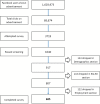Linked Patient-Reported Outcomes Data From Patients With Multiple Sclerosis Recruited on an Open Internet Platform to Health Care Claims Databases Identifies a Representative Population for Real-Life Data Analysis in Multiple Sclerosis
- PMID: 27658498
- PMCID: PMC5054235
- DOI: 10.2196/jmir.5805
Linked Patient-Reported Outcomes Data From Patients With Multiple Sclerosis Recruited on an Open Internet Platform to Health Care Claims Databases Identifies a Representative Population for Real-Life Data Analysis in Multiple Sclerosis
Abstract
Background: An enormous amount of information relevant to public health is being generated directly by online communities.
Objective: To explore the feasibility of creating a dataset that links patient-reported outcomes data, from a Web-based survey of US patients with multiple sclerosis (MS) recruited on open Internet platforms, to health care utilization information from health care claims databases. The dataset was generated by linkage analysis to a broader MS population in the United States using both pharmacy and medical claims data sources.
Methods: US Facebook users with an interest in MS were alerted to a patient-reported survey by targeted advertisements. Eligibility criteria were diagnosis of MS by a specialist (primary progressive, relapsing-remitting, or secondary progressive), ≥12-month history of disease, age 18-65 years, and commercial health insurance. Participants completed a questionnaire including data on demographic and disease characteristics, current and earlier therapies, relapses, disability, health-related quality of life, and employment status and productivity. A unique anonymous profile was generated for each survey respondent. Each anonymous profile was linked to a number of medical and pharmacy claims datasets in the United States. Linkage rates were assessed and survey respondents' representativeness was evaluated based on differences in the distribution of characteristics between the linked survey population and the general MS population in the claims databases.
Results: The advertisement was placed on 1,063,973 Facebook users' pages generating 68,674 clicks, 3719 survey attempts, and 651 successfully completed surveys, of which 440 could be linked to any of the claims databases for 2014 or 2015 (67.6% linkage rate). Overall, no significant differences were found between patients who were linked and not linked for educational status, ethnicity, current or prior disease-modifying therapy (DMT) treatment, or presence of a relapse in the last 12 months. The frequencies of the most common MS symptoms did not differ significantly between linked patients and the general MS population in the databases. Linked patients were slightly younger and less likely to be men than those who were not linkable.
Conclusions: Linking patient-reported outcomes data, from a Web-based survey of US patients with MS recruited on open Internet platforms, to health care utilization information from claims databases may enable rapid generation of a large population of representative patients with MS suitable for outcomes analysis.
Keywords: Internet; linkage analysis; multiple sclerosis; outcomes assessment.
Conflict of interest statement
VR, JM, and MO are employees of Novartis.
Figures





Similar articles
-
Work Productivity Outcomes Associated with Ocrelizumab Compared with Other Disease-Modifying Therapies for Multiple Sclerosis.Neurol Ther. 2021 Jun;10(1):183-196. doi: 10.1007/s40120-020-00224-1. Epub 2020 Nov 26. Neurol Ther. 2021. PMID: 33244713 Free PMC article.
-
The feasibility of collecting information from people with Multiple Sclerosis for the UK MS Register via a web portal: characterising a cohort of people with MS.BMC Med Inform Decis Mak. 2012 Jul 18;12:73. doi: 10.1186/1472-6947-12-73. BMC Med Inform Decis Mak. 2012. PMID: 22809360 Free PMC article.
-
Relapse prevalence, symptoms, and health care engagement: patient insights from the Multiple Sclerosis in America 2017 survey.Mult Scler Relat Disord. 2018 Nov;26:219-234. doi: 10.1016/j.msard.2018.09.002. Epub 2018 Sep 7. Mult Scler Relat Disord. 2018. PMID: 30368080
-
Treatment Patterns and Relapses Among Newly Treated Multiple Sclerosis Patients From a Retrospective Claims Analysis.Clin Ther. 2020 Nov;42(11):2136-2147.e3. doi: 10.1016/j.clinthera.2020.09.014. Epub 2020 Nov 5. Clin Ther. 2020. PMID: 33160682
-
Mitoxantrone: a review of its use in multiple sclerosis.CNS Drugs. 2004;18(6):379-96. doi: 10.2165/00023210-200418060-00010. CNS Drugs. 2004. PMID: 15089110 Review.
Cited by
-
Relation between Heart Rate Variability and Disease Course in Multiple Sclerosis.J Clin Med. 2019 Dec 18;9(1):3. doi: 10.3390/jcm9010003. J Clin Med. 2019. PMID: 31861312 Free PMC article.
-
Living with presbyopia: experiences from a virtual roundtable dialogue among impacted individuals and healthcare professionals.BMC Ophthalmol. 2022 May 5;22(1):204. doi: 10.1186/s12886-022-02432-9. BMC Ophthalmol. 2022. PMID: 35513787 Free PMC article.
References
-
- European Medicines Agency. 2013. Oct 18, [2016-08-31]. The patient's voice in the evaluation of medicines Internet http://www.ema.europa.eu/docs/en_GB/document_library/Report/2013/10/WC50... .
-
- US Food & Drug Administration United States Government Printing Offices. 2012. [2016-08-31]. Food and Drug Administration Safety and Innovation Act (FDASIA) Internet https://www.gpo.gov/fdsys/pkg/PLAW-112publ144/pdf/PLAW-112publ144.pdf .
-
- Stafinski T, Menon D, Nardelli A, Bakal J, Ezekowitz J, Tymchak W, Welsh R, Gyenes G, Armstrong PW. Incorporating patient preferences into clinical trial design: results of the opinions of patients on treatment implications of new studies (OPTIONS) project. Am Heart J. 2015 Jan;169(1):122–31.e22. doi: 10.1016/j.ahj.2014.10.002.S0002-8703(14)00606-1 - DOI - PubMed
-
- Salathé Marcel, Khandelwal S. Assessing vaccination sentiments with online social media: implications for infectious disease dynamics and control. PLoS Comput Biol. 2011 Oct;7(10):e1002199. doi: 10.1371/journal.pcbi.1002199. http://dx.plos.org/10.1371/journal.pcbi.1002199 PCOMPBIOL-D-11-00652 - DOI - DOI - PMC - PubMed
-
- Vayena E, Salathé Marcel, Madoff LC, Brownstein JS. Ethical challenges of big data in public health. PLoS Comput Biol. 2015 Feb;11(2):e1003904. doi: 10.1371/journal.pcbi.1003904. http://dx.plos.org/10.1371/journal.pcbi.1003904 PCOMPBIOL-D-14-00778 - DOI - DOI - PMC - PubMed
LinkOut - more resources
Full Text Sources
Other Literature Sources

